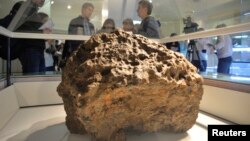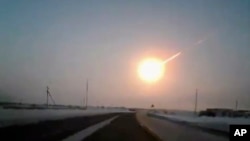SOCHI, RUSSIA —
The International Olympic Committee has shot down plans to give Saturday's medal-winning athletes at the Sochi Games a piece of a meteorite that exploded over Russia a year ago.
The fireball, traveling at a speed of 30 km (19 miles) per second, exploded on February 15, 2013 over Chelyabinsk, some 1,500 km (950 miles) east of Moscow, injuring 1,200 people following a massive shock wave.
Chelyabinsk region officials had wanted to mark the anniversary by giving athletes who won a medal at the Olympics on Saturday a piece of it but the IOC said it could only be done after the Games and separately.
"We know the local people of the region there wanted to give an extra gift to the athletes who will get the medals [on Saturday]," Olympic Games Executive Director Gilbert Felli said on Friday. "We have said there is no point to do it during the Games. If they want to give something to the athletes after the Games they can do it."
"But athletes get the gold medals awarded by the organizing committee and there is no extra gift from this region of Russia during the medal presentation," added Felli.
The IOC is fiercely protective of its brand, keeping the Games free from any outside involvement, especially during the competitions and the medal ceremonies that command multi-million audiences around the world.
The fields of play are also advertising-free despite the IOC's estimated $1.0 billion revenues from top sponsors for the period 2013-2016.
Photo Gallery: Winter Olympics Day 6
The fireball, traveling at a speed of 30 km (19 miles) per second, exploded on February 15, 2013 over Chelyabinsk, some 1,500 km (950 miles) east of Moscow, injuring 1,200 people following a massive shock wave.
Chelyabinsk region officials had wanted to mark the anniversary by giving athletes who won a medal at the Olympics on Saturday a piece of it but the IOC said it could only be done after the Games and separately.
"We know the local people of the region there wanted to give an extra gift to the athletes who will get the medals [on Saturday]," Olympic Games Executive Director Gilbert Felli said on Friday. "We have said there is no point to do it during the Games. If they want to give something to the athletes after the Games they can do it."
"But athletes get the gold medals awarded by the organizing committee and there is no extra gift from this region of Russia during the medal presentation," added Felli.
The IOC is fiercely protective of its brand, keeping the Games free from any outside involvement, especially during the competitions and the medal ceremonies that command multi-million audiences around the world.
The fields of play are also advertising-free despite the IOC's estimated $1.0 billion revenues from top sponsors for the period 2013-2016.
Photo Gallery: Winter Olympics Day 6







